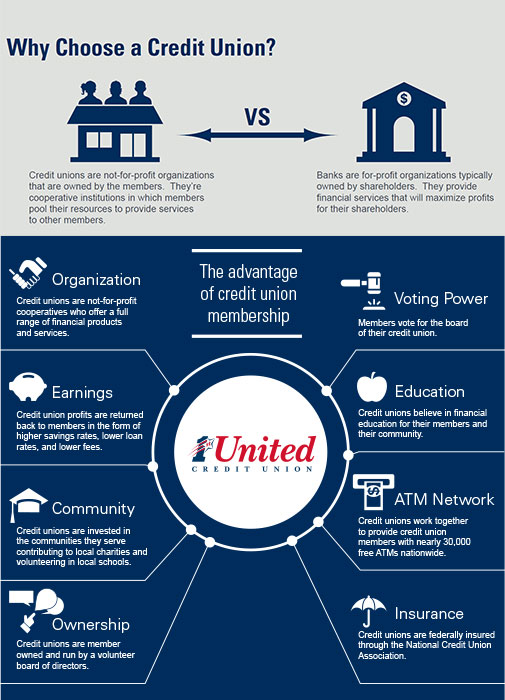Federal Credit Union: Reliable and Safe And Secure Financial in Wyoming
Federal Credit Union: Reliable and Safe And Secure Financial in Wyoming
Blog Article
The Ultimate Guide to Comprehending Lending Institution
Credit unions stand as one-of-a-kind economic entities, rooted in concepts of common support and member-driven operations. Beyond their foundational worths, understanding the detailed workings of credit unions entails a much deeper exploration. Unwinding the intricacies of membership qualification, the evolution of services offered, and the unique advantages they bring needs a detailed evaluation. As we navigate via the intricacies of lending institution, an informative journey awaits to clarify these member-focused institutions and exactly how they differ from standard financial institutions.
What Are Lending Institution?
Lending institution are member-owned banks that provide a series of financial solutions to their participants. Unlike typical financial institutions, credit score unions run as not-for-profit organizations, implying their key emphasis gets on offering their participants instead than making the most of earnings. Members of a credit score union generally share a common bond, such as functioning for the very same company, belonging to the same neighborhood, or becoming part of the very same company.
One of the crucial benefits of lending institution is that they often offer higher rates of interest on interest-bearing accounts and reduced rate of interest on financings contrasted to banks. This is due to the fact that cooperative credit union are structured to profit their participants directly, permitting them to hand down their incomes in the kind of much better rates and less costs. Additionally, cooperative credit union are understood for their individualized customer support, as they prioritize developing partnerships with their participants to understand their one-of-a-kind economic demands and objectives.
Background and Advancement of Cooperative Credit Union

The roots of member-owned monetary cooperatives, recognized today as credit report unions, trace back to a time when communities looked for options to typical financial organizations. The principle of credit rating unions come from in the 19th century in Europe, with Friedrich Wilhelm Raiffeisen frequently attributed as the leader of the participating financial activity (Wyoming Federal Credit Union). Raiffeisen started the very first recognized cooperative credit union in Germany in the mid-1800s, stressing neighborhood support and self-help principles
The development of credit history unions continued in North America, where Alphonse Desjardins developed the very first lending institution in copyright in 1900. Soon after, in 1909, the very first U.S. credit score union was created in New Hampshire by a group of Franco-American immigrants. These very early cooperative credit union operated the basic principles of mutual assistance, autonomous control, and participant ownership.
Over time, debt unions have grown in popularity worldwide because of their not-for-profit framework, emphasis on offering members, and supplying competitive financial product or services. Today, credit scores unions play an important function in the monetary sector, giving obtainable and community-oriented banking options for businesses and individuals alike.
Subscription and Qualification Standards
Membership at a credit scores union is generally restricted to people meeting particular qualification standards based on the institution's founding principles and regulatory demands. Some credit report unions might only offer individuals who work or live in a particular location, while others may be tailored to staff members of a certain company or participants of a certain association.
Furthermore, lending institution are structured as not-for-profit companies, meaning that their key objective is to offer their members as opposed to create revenues for shareholders. This emphasis on participant solution commonly equates right into even more individualized attention, reduced fees, and affordable interest prices on financial savings and fundings accounts. By meeting the eligibility requirements and coming to be a member of a lending institution, people can access a series of economic services and products customized to their certain needs.
Services and Products Used
One of the vital facets that sets debt unions apart is the varied variety of economic services and items they use to their participants. Credit unions commonly offer typical financial solutions such as savings and examining accounts, financings, and credit report cards.
Furthermore, cooperative credit union commonly offer convenient online and mobile financial choices for participants to quickly manage their financial resources. They may provide perks such as common branching, allowing participants to access their accounts at various other cooperative credit union throughout the nation. Some credit report unions likewise provide insurance policy items like home, life, and Federal Credit Union automobile insurance coverage to assist participants safeguard their possessions and enjoyed ones.
Along with financial services, lending institution frequently involve in neighborhood outreach programs and financial education and learning campaigns to support their participants in achieving their financial objectives.
Benefits of Banking With Cooperative Credit Union
When thinking about financial establishments, exploring the benefits of banking with debt unions exposes one-of-a-kind benefits for members looking for individualized solution and competitive prices. Unlike large banks, credit report unions are member-owned and focus on building solid relationships with their members. Overall, financial with a credit rating union can provide an extra tailored, cost-effective, and member-centric financial experience.
Conclusion

Credit report unions are member-owned monetary establishments that provide a range of banking solutions to their members. The concept of credit scores unions come from in the 19th century in Europe, with Friedrich Wilhelm Raiffeisen often attributed as the pioneer of the participating financial motion.The advancement of credit scores unions continued in North America, where Alphonse Desjardins developed the initial credit report union in copyright in 1900. Credit score unions generally offer conventional financial solutions such as savings and checking accounts, car loans, and debt cards.When taking into consideration financial institutions, exploring the benefits of financial with credit rating unions reveals special advantages for participants seeking customized service and competitive rates.
Report this page